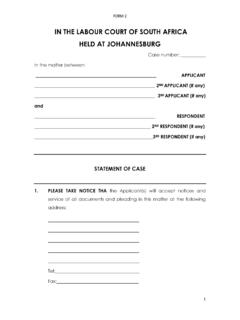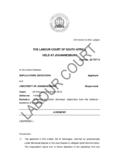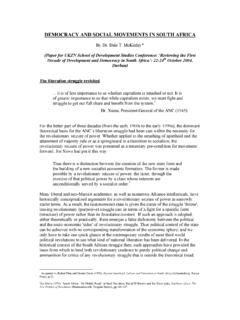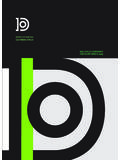Transcription of IN THE LABOUR APPEAL COURT OF SOUTH AFRICA (HELD AT ...
1 IN THE LABOUR APPEAL COURT OF SOUTH AFRICA (HELD AT johannesburg )Case No.: JA 08/2004 shoprite CHECKERS (PTY) LTDA ppellantandCOMMISION FOR RECONCILIATION,MEDIATION & ARBITRATIONF irst RespondentROMODIKE, W, RespondentSOUTH AFRICAN COMMERCIAL CATERINGAND ALLIED WORKERS UNIONT hird RespondentNKUNA, SFourth RespondentJUDGMENT:DAVIS JA:Introduction [1]On 15 November 2000, appellant charged fourth respondent, an assistant baker at its store in Louis Trichardt as follows: 1. Dishonesty, alternatively in breach of company rules in that you consumed company property without paying;2. Breach of company rules in that you consumed food and drink in places not designated therefore. [2]On 13 December 2000 the fourth respondent was found guilty as charged at a disciplinary enquiry and subsequently dismissed. He challenged both the substantive and procedural fairness of his dismissal at an arbitration convened by first respondent and presided over by second respondent.
2 [3]On 11 September 2001 second respondent found that fourth respondent s dismissal had been substantively unfair, on the basis that he was not guilty of the charges of misconduct brought against him. Accordingly he ordered his reinstatement. [4]On 23 October 2001 appellant launched an application for review to set aside second respondent s award in terms of section 145 of the LABOUR Relations Act 66 of 1995 ( The Act ). On 26 September 2003 Revelas J, in the LABOUR COURT , handed down a judgment in which she found that, while second respondent s findings on guilt were open to attack on review, the sanction of dismissal was unfair in the circumstances. Accordingly, she substituted second respondent s award of reinstatement to that of a final written warning. With leave of the COURT a quo, appellant has come before this COURT on APPEAL against this decision. The substance of the dismissal [5]On APPEAL , Ms Sikhakhane counsel for fourth respondent, conceded that the appellant had proved the charges against her client.
3 Accordingly, the case turned exclusively on the nature of the appropriate sanction. [6]This concession was wisely made. The evidence of Mr van Staden, theadministration manager of appellant and Mr Mthombeni, the store manager, confirmed that appellant had installed surveillance video cameras in the store during October 2000. Fourth respondent was clearly captured on these video cameras contravening store policy on two separate occasions. On 7 October 2000 the video shown to second respondent revealed that fourth respondent had eaten a plate of pap and that, before he consumed the pap, he had ensured that the roller door was closed so that no one could see his actions. [7]On 11 October 2000 the video revealed fourth respondent removing a piece of bread from the preparation table of the deli, a department of the store in which he did not work.
4 He consumed the bread after having opened and looked into the 2 pap cooker in the deli to see if the pap was ready. Less than an hour later, having placed a plate of pap on a trolley in the preparation area of the bakery, fourth respondent proceeded to eat the pap while in the process blocking the whole view of the food with his back , according to the testimony of Mr van Staden which was uncontested. Further, as Mr van Staden testified, he was found peeping around to see if someone was coming Mr van Staden also confirmed that fourth respondent was careful not to consume any food when other people passed by him. Two hours later fourth respondent sat down at the preparation table and ate pap from a dish or container, having decanted it from another container.[8]The fourth respondent s developed a defence to the theft of the three helpings of pap and the piece of bread as well as the prohibited consumption thereof in the preparation areas in the bakery and the deli.
5 He claimed that he had purchased the pap from Ms Mudumela, an informal food trader, who delivered the food to him at work. Hence he denied that he had stolen pap from the store. While the piece of bread that fourth respondent consumed belonged to appellant and was consumed without permission having been obtained, he claimed that he had eaten it in the process of testing the bread which had been baked the previous day for [the deli ] to prepare sandwiches . He further testified that Mr Mthombeni had given employees, such as fourth respondent in the bakery and deli, permission to drink tea and coffee and eat at their work places. Accordingly, he had not contravened any rule by virtue of his conduct depicted on the [9]The evidence of Ms Mudumela proved to be of no assistance to fourth respondent. She was not in a position to confirm whether fourth respondent was involved in consuming her pap during the incidents captured on the video on 7 and 11 October 2000.
6 She was not able to confirm that the plate and bowl from which fourth respondent ate, and which was depicted on the video, belonged to her.[10]Fourth respondent also gave contradictory versions regarding why he had proceeded to the deli on 11 October 2000, including that he had attempted to assist the deli staff in serving customers, that on the request of the deli supervisor he had tested bread, that he had to check the pap cooker and that he had to check the yeast that was kept in the deli fridge .[11]The finding by second respondent that fourth respondent was not guilty of eating in the prohibited area and therefore not guilty of dishonesty in consuming the pap and bread which belonged to the appellant was based on an uncritical acceptance of fourth respondent s testimony which, as I already noted, was unsatisfactory in the extreme. In addition, the evidence of both Mr Mthombeni and Mr Van Staden was clear: there was no basis for the contention that employees in the bakery and deli area, who were allowed to drink tea at their workplace, were also entitled to eat at the same time.
7 Such conduct was contrary to the clear, published rules of appellant. None of this evidence was taken into account by second respondent. [12]The inability of Ms Mudumela to provide any substantial support for the version of fourth respondent was also ignored in the findings of second respondent. [13]When the matter came before Revelas J, she found: The arbitrator may be wrong in the conclusion based on the evidence before her, but it is not necessary for me to make a finding as to whether she was incorrect or correct with regard to her findings on the evidence. I still need to consider whether the dismissal was fair and whether it was indeed the appropriate sanction even if I agree with the applicant s contentions. It is quite trite that employers in a retail business suffer huge financial losses as a result of shrinkage caused, inter 4 alia, by their staff who steal from them.
8 It is also trite that dismissal would, in the vast majority of cases, be the only appropriate sanction. Yet I believe that this was a case where dismissal should not have been imposed. [14]In my view, Revelas J erred in adopting this approach. For the learned judge to deal with the question of a sanction for dismissal, the prior question, namely whether the dismissal was fair, had to be answered. On the basis of the evidence as I have outlined it, the dismissal was substantively fair. There was also no objection to the procedural basis of the dismissal. Having so found that the dismissal was fair, Revelas J could then have properly moved on to deal with the appropriate sanction. The appropriate sanction[15]Mr Myburgh, who appeared on behalf of the appellant, produced a meticulous and carefully researched set of arguments concerning the question of the appropriate sanction. He submitted that the decision by Revelas J not to dismiss fourth respondent because of the relatively small value of the items which was stolen and the nine years of an unblemished service record of fourth respondent was at odds with the jurisprudence of this COURT .
9 [16]In brief, this COURT has consistently followed an approach, laid out early in the jurisprudence of the LABOUR COURT in Standard Bank SA Limited v CCMA and others [1998] 6 BLLR 622 at paras 38 41 where Tip AJ said: It was one of the fundamentals of the employment relationship that the employer should be able to place trust in the A breach of this trust in the form of conduct involving dishonesty is one that goes to the heart of the employment relationship and is destructive of it. [17]That decision was followed by Mlambo J (as he then was) in Metcash Trading Limited t/a Metro Cash and Carry and another v Fobb and another (1998) 19 ILJ 1516 (LAC) at para 16 17 where the learned judge found that in relation to the consumption of one 250 ml bottle of orange juice theft is theft and does not become less because of the size of the article stolen or misappropriated .[18]In Leonard Dingler (Pty) Ltd v Ngwenya (1999) 20 ILJ 1171 (LAC) an employee was found guilty of removing a few bale boards from the premises, each bale board being worth no more than He was dismissed.
10 When the matter came before this COURT , Kroon JA said the following at para 78: Was dismissal of the respondent an unfair sanction? I am persuaded that this question falls to be answered in the negative. It is true that the respondent had a long record of service (7 years 10 ) with no 5 previous record of a disciplinary offence. On the other hand, Oosthuizen testified that the appellant experienced theft by its employees on a large scale. It follows that a measure of deterrence is called for. The respondent s conduct was not only dishonest but was premeditated, planned and persistent. The overlapping triad of misconduct, incapacity and operational necessity .. was present. Moreover, regard may further be had to the manner in which the respondent conducted his case in the COURT a quo. It embraced a false accusation of perjury against, inter alia, a director, of the appellant and a charge against him that for ulterior motives he made a false accusation the subject of disciplinary proceedings against the respondent.
















